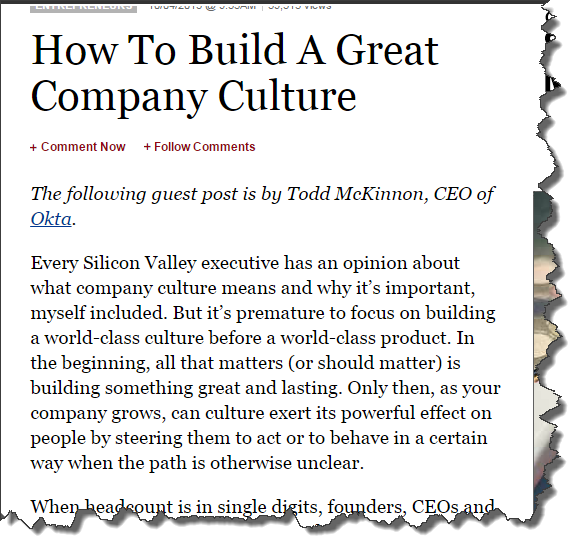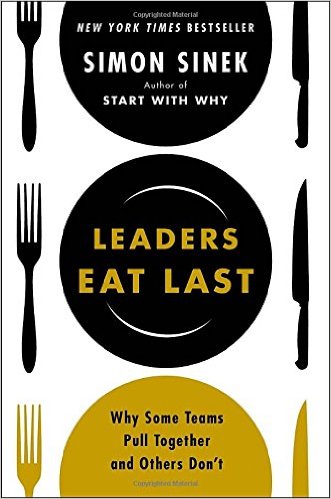An excellent culture might be perceived as a form of "perfection". At what point does one draw the line, point and say: "Now we have achieved an excellent culture." Once the line is drawn, the excellence achieved, a few will be looking over their shoulder more worried about the achievement of culture vs. the people, purpose and profit of the organization.
Do you look around an organization you lead, are a member of or work for and ask yourself "how long will I put up with this?" If so, you will not find the answers internally. The answers are external and yes, you can have an impact on the culture at almost any level.
Defined: Organizational culture is the behavior of humans within an organization and the meaning that people attach to those behaviors.
If you read Forbes magazine, Todd McKinnon says "A world class company culture is secondary to creating a world class product." Which brings us to the question: "Which comes first, the chicken (team culture) or the egg (product)." -

Read the complete article here >
If you can believe the "Change the culture, Change the company" mantra, here are questions to ask:
- How can the current organizational culture be measured?
- Does organizational culture have more impact that strategy?
- Do the "cultural" mindsets control the reality of what people and teams embrace?
- What will changing the organization culture miss? (What is impossible to change?)
- If changing the culture can have an impact, how can change be implemented?
Are you power hungry, career minded and focused on moving up the ladder? Are you aware of how your personal beliefs and leadership creates ripples?
Consider these personal questions:
- Do you have a blindness or are you aware and understand your leadership effectiveness?
- Do you know how to recognize when people are kissing up and only to do the opposite behind your back?
- Have you noticed how others pass the buck and give up accountability?
- Do you find many resistant to change and anti-innovation?
- Which is seen more? Passive reactivity or proactive accountability?
- How many times do you see conflictive avoidance, fear & the resulting inferior performance in your team and/or organization?
Focusing more on these six questions will help you achieve more success. Your improved awareness will result in more cooperation. As you see small improvements, you will be hungry for more.
There are consultants, programs, classes and books to help support your new vision of creating what you will call an "excellent culture".
Here are expectations in your search:
- A scientific organizational culture assessment which can benchmark your current business culture against those with excellence.
- The ability to gain clarity for at least two different types of cultures.
- How to recognize a culture which is "broken".
- How to quickly recognize the characteristics of a culture with excellence.
- How to build an organizational culture with excellence.
- What to do when people and cultures in an organization clash.
- How to identify and understand the characteristics in individuals and a team to bring excellence.
- What are the stages of successful team growth and how to maximize opportunities for them.
- Learn what is real accountablity?
- How to create a voluntary team with co-accountablity
- How to be most effective with self-management
Steve Gandara - Excellent Cultures
If you are local to the Seattle area, you can attend this workshop: Achieving Excellent Culture on November 19th and 20th. Steve Gandara is leading the two day workshop for those interested. This workshop will give you the tools to master the healthiest and most effective ways to improve as a leader, and make the changes you want for yourself and your team.
Why this is important:
Entrepreneurs and intrapreneurs (entrepreneurs who work inside an organization) can be inconsistent, dominating, lack listening skills and prefer to fire people vs develop a team.
When people believe in something or someone, it impacts the culture and innovation thrives. Missions need believers and an excellent culture.
Take a class, read a book... don't leave it to chance.
Leaders Eat Last: Why Some Teams Pull Together and Others Don’t
